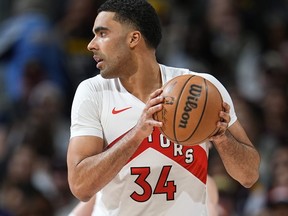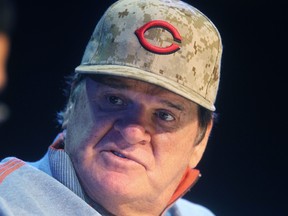
Article content
“I was getting up in the morning and betting on Lithuanian under-20 basketball matches.” — Ex-British soccer star Paul Merson on his gambling addiction.
Advertisement 2
Article content
It has been predicted that the explosion in legalized sports betting would unleash a tidal wave of woe.
Article content
The Toronto Raptors’ Jontay Porter discovered that when he was banned for life from the NBA after a league investigation found he had violated league betting rules. Porter wasn’t good enough to move the needle on any points spread, but when it came to parlays, well…
According to the league, Porter was alleged pals with a known NBA bettor, who “placed an $80,000 parlay proposition bet with an online sportsbook, to win $1.1 million, wagering that Porter would underperform in the March 20 game.”

Porter only played three minutes in the March 20 game before leaving, claiming he was sick. He has not commented since the investigation began, but his brother Michael Porter Jr., a forward with the Denver Nuggets, publicly defended his brother during the investigation, saying he “highly” doubted he would jeopardize his career by being associated with gambling.
Article content
Advertisement 3
Article content
Basketball Hall of Famer and former U.S. senator Bill Bradley spoke too soon in January.
“Well, there hasn’t been a scandal yet,” he told the New York Times. “So the worst has been avoided, but all of the conditions are there for the untoward to occur.”
And that’s where U.S. Integrity comes in. The sports betting watchdog works with 150 clients in 36 states to detect — and report — suspicious gambling action.

“We’re the front-end alerting system for the entire industry,” co-founder and CEO Matthew Holt told the Las Vegas Review-Journal. “We average 15 to 18 alerts per month and about half of those lead to suspensions, bans or arrests related to nefarious sports betting activity.
“Some of them are international and don’t always get the same headlines as American events. But they’re equally important to us, our clients and the people who may have bet on those events.”
Advertisement 4
Article content
Recommended from Editorial
-

SIMMONS: A dreadful Raptors season ends with NBA player banned for life
-

Judge in sports betting case orders ex-interpreter for Ohtani to get gambling addiction treatment
-

Senators’ Pinto returns to ice after 41-game suspension for gambling
Among their targets were suspicious bets on an April 2023 Alabama-Louisiana State baseball game.
Now, the Temple University men’s basketball team is in their sights.

The Alabama brouhaha led to the firing of Crimson Tide bench boss Brad Bohannon. He was allegedly on the phone with a gambler at a sportsbook at Cincinnati’s Great American Ball Park.
A wager was placed on LSU. The inside skinny was that ‘Bama’s ace would allegedly be a scratch for the start. LSU won 8-6.
Bohannon allegedly refused to be a part of the NCAA investigation and attempts by the Tuscaloosa News to reach him for a comment had not been successful, either.
Advertisement 5
Article content
Using algorithms to detect suspicious activity, Holt’s team identifies the quirks, investigates and then acts.
“Whatever our system or our staff pick up, it goes to one of our analysts and they’ll investigate it in real time to determine if they think it elevates to the level of alert,” he said.

“If they do, they send out an alert to all regulators and operators in relevant jurisdictions with a mandated response form for those operators. Did you accept wagering on this event? Yes or no? And did you see any similar activity? If yes, please explain.
“All of those mandated response forms are due within six hours, so within six hours we can aggregate all those reports and disseminate them out to the collective investigative agencies who might be investigating.”
Advertisement 6
Article content
RECOMMENDED VIDEO
Often, it’s the sportsbooks themselves that forward their suspicions.
Holt knows all the tricks given he worked in the sportsbook industry before starting his company in 2018 when the ban on sports betting was lifted. The NBA became a client in the company’s first year along with several college sports conferences.

“That sort of has skyrocketed now to where we work with almost every major professional and collegiate sports league, almost every regulated sportsbook in North America and regulators in 36 states in the U.S., as well as Alberta, Ontario and Puerto Rico,” Holt said.
MLB has also signed up.
The company now has an anonymous tip line for players, coaches and other staff.
“Any time you log in to a sports betting app in the U.S., you’re geolocated instantaneously,” he told the Review-Journal.
Advertisement 7
Article content
“When there are times, especially around practice times for professional or collegiate sporting events, when the only people in the arena or stadium are the people practising but there are all these pings from sportsbook logins, it’s pretty easy to catch sometimes.”
Ex-MLB commissioner Faye Vincent was part of the probe that banned all-time hits leader Pete Rose from baseball and Cooperstown.
“I’m 85 years old so I won’t be around, but I don’t think the next 20 or 30 years is going to be a pretty story about gambling in the sports world because the money is going to be so enormous, and wherever the money is enormous the corruption follows,” he told the Times.
X: @HunterTOSun
Article content









